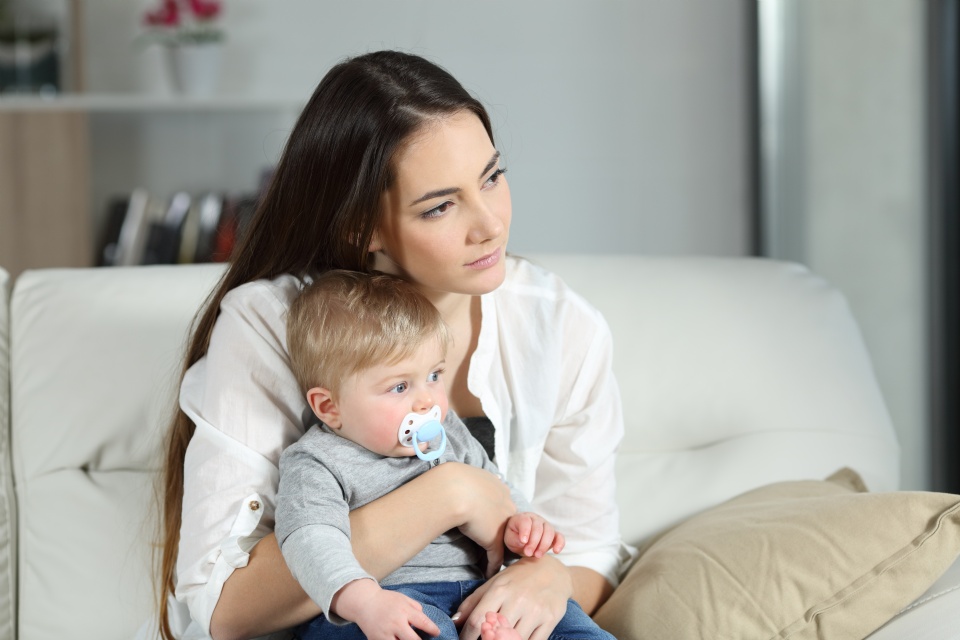Postpartum
depression often gets marginalized and minimized, but for many women it’s a
debilitating
and frightening experience. Statistics Canada reports that it affects 7.5 per
cent of
Canadian
women and that figure gets significantly higher when it comes to other
perinatal mental health disorders such as postpartum anxiety.
The
Causes and Symptoms
Postpartum
depression is a severe form of clinical depression related to pregnancy and
childbirth. It typically develops anywhere from two weeks to one month after
delivery, but can also begin prior to delivery.
Many new mothers report feeling the “baby blues” after
giving birth. They may feel overwhelmed by hormonal changes, sleep deprivation
and their new responsibilities. However,
postpartum
depression is more severe and can have life-threatening consequences in some
cases.
Symptoms include extreme sadness, irritability and anxiety. Other symptoms can
cause
mothers
to feel disinterested in their baby and to withdraw. Doctors warn if these
symptoms persist after a few weeks, it is in both the mother and child’s best
interest to seek medical care.
The exact cause is unclear, but it is believed to be a
combination of physiological and emotional factors. Hormonal changes can often
contribute to perinatal mental health disorders. Pre-existing mental health
challenges and family history can also be contributing factors.
The
Stigma
Postpartum
depression carries a massive stigma and people don’t often talk about it
openly. Christina Cory experienced that stigma firsthand. She was diagnosed
with postpartum depression when her baby was only four weeks old. It lasted
seven months and got quite severe, with Cory seeking therapy and medication to
help her through the ordeal.
She was lucky to have support from family and friends, but
still felt she could not talk about it openly outside her close network. “Many
people stereotype depression,” she says. “They assume these people just wallow,
mope, and cannot snap out of it, as though they brought it on themselves.”
This is compounded by the fact that new mothers experiencing
postpartum depression
often
feel guilt and shame. Postpartum doula Millie Tresierra notes that we no longer
live in a
culture
where birth, pregnancy, and childcare are supported by the community. There’s a
certain
amount
of pressure on women to be perfect mothers, as well as an expectation of how
blissful
pregnancy
and having a baby will be.
“We are continually bombarded with images of women radiant in
pregnancy, and relishing every moment of their baby’s first year of life,” says
Tresierra. “But as we know, this is unrealistic.” It may be better to open a
dialogue regarding everyone’s unique experience of pregnancy and the postpartum
period, and allow women the space to express and share their experience in a
more authentic way.
Effective Treatments
If you’ve been diagnosed with
postpartum depression or anxiety, know you’re not alone. Luckily, it’s a
treatable condition. Here’s a quick list of effective treatments;
- Therapy; Talking to a professional can make a huge difference. It helps you unload your feelings in a safe space, and through the cultivation of self-awareness, you can learn to identify your triggers and work through them in constructive ways.
- Medication; You can speak to your doctor about your options. There are also more alternative approaches to appeasing the symptoms.
- Diet and exercise; Despite exhaustion, make it a point to go for walks and engage in some type of physical activity. And make an effort to eat a balanced diet with whole, fresh foods.
- Include fun things in your day; As bleak as things may seem, try to participate in some fun activities that bring you joy.
- Seek support; Be gentle with yourself and seek support. You can share with friends or get involved in a support group. There’s no reason to suffer alone.
If you or someone you know seems to be suffering from postpartum depression, seek help immediately. If you are a new mother experiencing some of these symptoms and worry you may cause harm to yourself or your child, it is advised to call a friend or relative to stay with you until you are able to seek appropriate care. Postpartum depression is not your fault and there are places to turn for help, starting with your local CLSC or your family doctor.

 In The Latest Issue:
In The Latest Issue:


 BY:
BY: 

Tweet
Share